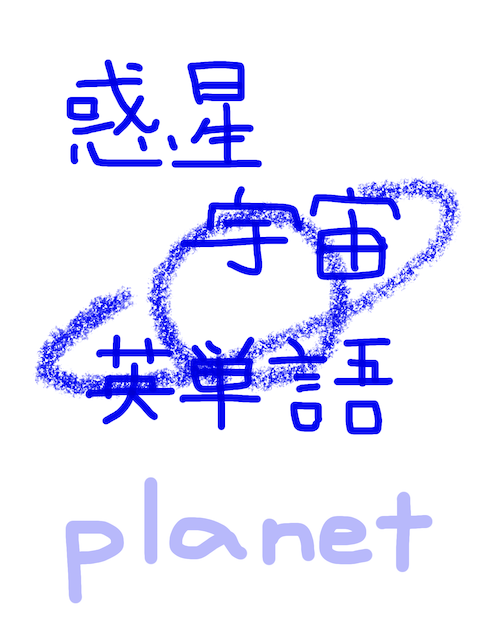【惑星宇宙 英単語】
〜目次〜
【惑星 Planets】
水星 Mercury
金星 Venus
地球 Earth
火星 Mars
木星 Jupiter
土星 Saturn
天王星 Uranus
海王星 Neptune
【準惑星 Dwarf Planets】
ケレス Ceres
冥王星 Pluto
ハウメア Haumea
マケマケ Makemake
エリス Eris
【宇宙関連語】
宇宙 space / universe / outer space / cosmos
宇宙飛行士 astronaut
宇宙船 spacecraft / spaceship / space shuttle / rocket
宇宙服 spacesuit
宇宙人 alien / extraterrestrial
未確認飛行物体 UFO / flying saucer
衛星 satellite / moon
恒星 star
星間の interstellar
小惑星 asteroid
彗星 comet
流星 meteor
流れ星 shooting star / falling star
隕石 meteorite
クレーター crater
軌道 orbit
自転 rotation
公転 revolution
太陽系 solar system
銀河系 galaxy
ブラックホール black hole
ビッグバン big bang
ダークマター dark matter
天文学 astronomy
天文学者 astronomer
天文ファン stargazer
天文台 astronomical observatory
重力 gravity
無重力 weightlessness / zero gravity
大気圏 atmosphere
日食月食 eclipse
光年 light-year
エドウィン・ハッブル Edwin Hubble
ユーリ・ガガーリン Yuri Gagarin
ニール・アームストロング Neil Armstrong
米国航空宇宙局 NASA
宇宙航空研究開発機構 JAXA
【惑星 Planets】
水星 Mercury / 金星 Venus / 地球 Earth / 火星 Mars / 木星 Jupiter / 土星 Saturn / 天王星 Uranus / 海王星 Neptune
【ˈməːʳkjəri】
【ˈməːʳkjəri】
—
メルクリウス・マーキュリー ((ローマ神話の商業・雄弁などの神))
※ 主な衛星(確定衛星数 0)
(2023年5月24日現在 以下同様)
なし
【ˈviːnəs】
【ˈviːnəs】
—
ウェヌス、ビーナス ((ローマ神話の女神))
※ 主な衛星(確定衛星数 0)
なし
【əːʳθ】
【əːʳθ】
The spaceship traveled back to earth.
宇宙船が地球に帰還した
The comet will pass close to the earth next year.
来年彗星が地球(the earth)に接近する
scientists who are studying the origins of life on earth
地球上(on earth)の生命の起源を研究している科学者たち
※ 主な衛星(確定衛星数 1)
Moon 【muːn】
【mɑːʳz】
【mɑːʳz】
—
マルス ((ローマ神話の軍神))
※ 主な衛星(確定衛星数 2)
Mars Moons
Phobos 【ˈfoʊbɒs, ˈfoʊbəs】、Deimos 【ˈdaɪməs, ˈdiːməs】
(衛星名の発音 wikiより 以下同様)
【ˈdʒuːpɪt̬ər ǁ -tə】
【ˈdʒuːpɪt̬ər ǁ -tə】
—
ジュピター ((古代ローマの主神))
※ 主な衛星(確定衛星数 72)
Jupiter Moons
Io 【ˈaɪ.oʊ】、Europa 【jʊˈroʊpə】、Ganymede 【ˈɡænəˌmiːd】、Callisto 【kəˈlɪstoʊ】、Amalthea 【æməlˈθiːə】
【ˈsæt̬ərn ǁ ˈsætən】
【ˈsæt̬ərn ǁ ˈsætən】
—
サトゥルヌス ((ローマ神話の農耕の神))
※ 主な衛星(確定衛星数 66)
Saturn Moons
Mimas 【ˈmaɪməs】、Enceladus 【ɛnˈsɛlədəs】、Tethys 【ˈtɛθəs, ˈtiːθəs】、Dione 【daɪˈoʊniː】、Rhea 【ˈriː.ə】
【jʊˈreɪnəs, ˈjʊrənəs ǁ ˈjʊərənəs】
【jʊˈreɪnəs, ˈjʊrənəs ǁ ˈjʊərənəs】
—
ウラノス ((ギリシャ神話の天の神))
※ 主な衛星(確定衛星数 27)
Uranus Moons
Ariel 【ˈɛəriəl, ˈæriəl】、Umbriel 【ˈʌmbriəl】、Titania 【təˈtɑːniə, təˈteɪniə】、Oberon 【ˈoʊbərɒn, ˈoʊbərən】、Miranda 【məˈrændə】
【ˈneptuːn ǁ -tjuːn】
【ˈneptuːn ǁ -tjuːn】
—
ネプチューン ((ローマ神話の海神))
※ 主な衛星(確定衛星数 14)
Neptune Moons
Triton 【ˈtraɪtən】、Nereid 【ˈnɪəriəd】、Naiad 【ˈneɪəd, ˈnaɪæd, ˈnaɪəd】、Thalassa 【θəˈlæsə】、Despina 【dəˈspaɪnə, dəˈspiːnə, dɛ-】
【準惑星 Dwarf Planets 【dwɔːʳf -】】
※ 太陽の周囲を公転する惑星以外の天体のうち、それ自身の重力によって球形になれるだけの質量を有するもの wikiより
ケレス Ceres / 冥王星 Pluto / ハウメア Haumea / マケマケ Makemake / エリス Eris
【ˈsɪəriːz】
【ˈsɪəriːz】
(準惑星名の発音 wikiより 以下同様)
—
※ 主な衛星(確定衛星数 0)
(2016年4月27日現在 以下同様)
なし
※ ケレスは、火星と木星の間の小惑星帯に位置する
【ˈpluːt̬oʊ ǁ -toʊ】
【ˈpluːt̬oʊ ǁ -toʊ】
—
プルートー ((ギリシャ神話の冥界の神))
※ 主な衛星(確定衛星数 5)
Pluto Moons
Charon 【ˈkɛərɒn, -ən, ˈʃærən】、Nix 【ˈnɪks】、Hydra 【ˈhaɪdrə】、Kerberos 【ˈkɜːrbərɒs, -əs】、Styx 【ˈstɪks】
※ 太陽からの距離は
海王星より先に「冥王星」、そして以降記載する「ハウメア」「マケマケ」「エリス」と続くようです
【haʊˈmeɪ.ə, ˌhɑːuː-】
【haʊˈmeɪ.ə, ˌhɑːuː-】
—
※ 主な衛星(確定衛星数 2)
Haumea Moons
Hi’iaka 【hiːʔiˈɑːkə】、Namaka 【nɑːˈmɑːkə】
【UK: /ˌmækiˈmæki/, US: /ˌmɑːkiˈmɑːki, ˌmɑːkeɪˈmɑːkeɪ】
【UK: /ˌmækiˈmæki/, US: /ˌmɑːkiˈmɑːki, ˌmɑːkeɪˈmɑːkeɪ】
—
※ 主な衛星(確定衛星数 0)
なし
【ˈɛrɪs, ˈɪərɪs】
【ˈɛrɪs, ˈɪərɪs】
—
※ 主な衛星(確定衛星数 1)
Eris Moon
Dysnomia 【dɪsˈnoʊmiə, daɪˈsnoʊmiə】
【宇宙関連語】
宇宙 space / universe / outer space / cosmos / 宇宙飛行士 astronaut / 宇宙船 spacecraft / spaceship / space shuttle / rocket / 宇宙服 spacesuit / 宇宙人 alien / extraterrestrial / 未確認飛行物体 UFO / flying saucer / 衛星 satellite / moon / 恒星 star / 星間の interstellar / 小惑星 asteroid / 彗星 comet / 流星 meteor / 流れ星 shooting star / falling star / 隕石 meteorite / クレーター crater / 軌道 orbit / 自転 rotation / 公転 revolution / 太陽系 solar system / 銀河系 galaxy / ブラックホール black hole / ビッグバン big bang / ダークマター dark matter / 天文学 astronomy / 天文学者 astronomer / 天文ファン stargazer / 天文台 astronomical observatory / 重力 gravity / 無重力 weightlessness / zero gravity / 大気圏 atmosphere / 日食月食 eclipse / 光年 light-year / エドウィン・ハッブル Edwin Hubble / ユーリ・ガガーリン Yuri Gagarin / ニール・アームストロング Neil Armstrong / 米国航空宇宙局 NASA / 宇宙航空研究開発機構 JAXA
【惑星 Planets】
【準惑星 Dwarf Planets】
【speɪs】
【speɪs】
There wasn’t much space at her home.
彼女の家にはあまりスペースがなかった
There were no spaces left in the parking lot.
駐車場には空きがなかった
Gagarin was the first man in space (× in the space).
人類で初めて宇宙に行ったのはガガーリンである
※ 「宇宙空間」の意味で space の前に定冠詞 the は不可 単に space を用いる
(物と物の間の) 空き・場所・空欄
宇宙・宇宙空間
【ˈjuːnəˌvəːʳs】
【ˈjuːnəˌvəːʳs】
new theories about the origins of the universe
宇宙の起源についての新たな学説
The kitchen was the hub of her universe.
台所は彼女の世界の中心だった
《常に単数形で》 (人が活動する) 世界
【aʊt̬ər ǁ aʊtə speɪs】
【aʊt̬ər ǁ aʊtə speɪs】
—
【ˈkɑːzmoʊs, -məs ǁ ˈkɔzmɔs】
【ˈkɑːzmoʊs, -məs ǁ ˈkɔzmɔs】
the idea that the cosmos was created by God
宇宙が神によって創られたという考え
【ˈæstrəˌnɔːt, -ˌnɑːt ǁ -ˌnɔːt】
【ˈæstrəˌnɔːt, -ˌnɑːt ǁ -ˌnɔːt】
the famous American astronaut, Neil Armstrong
有名なアメリカの宇宙飛行士、ニール・アームストロング
【ˈspeɪsˌkræft ǁ -ˌkrɑːft】
【ˈspeɪsˌkræft ǁ -ˌkrɑːft】
The spacecraft was about to re-enter the Earth’s atmosphere.
宇宙船は地球の大気圏に再突入するところであった
【ˈspeɪsˌʃɪp】
【ˈspeɪsˌʃɪp】
—
【speɪs ʃʌt̬l ǁ ʃʌtl】
【speɪs ʃʌt̬l ǁ ʃʌtl】
—
【ˈrɑːkɪt ǁ ˈrɔk-】
【ˈrɑːkɪt ǁ ˈrɔk-】
an orbiting space rocket
軌道を回る宇宙ロケット
Guerrillas were firing rockets into the city.
ゲリラは市内にロケット弾を打ち込んでいた
ロケット弾・ロケットミサイル
【ˈspeɪs-suːt ǁ -sjuːt】
【ˈspeɪs-suːt ǁ -sjuːt】
—
【ˈeɪliən】
【ˈeɪliən】
illegal aliens
不法滞在者
※ alien は公式文書などで用いられるフォーマルな語
Some people believe they have been abducted by aliens.
自分たちがエイリアンに拉致されたと信じる人もいる
エイリアン・地球外生命体
【ˌekstrətəˈrestriəl】
【ˌekstrətəˈrestriəl】
We believe that extraterrestrials once visited this planet.
かつて宇宙人がこの地球にやってきたと私たちは信じている
【ˈjuːfoʊ, ˌjuː ef ˈoʊ】
【ˈjuːfoʊ, ˌjuː ef ˈoʊ】
—
【flaɪ-ɪŋ sɔːsəʳ】
【flaɪ-ɪŋ sɔːsəʳ】
Some people believe in flying saucers.
空飛ぶ円盤の存在を信じる人もいる
【ˈsætəˌlaɪt】
【ˈsætəˌlaɪt】
the launch of a communications satellite
通信衛星の打ち上げ
The moon is a satellite of the Earth.
月は地球の衛星である
〘専門〙 衛星 (a natural object that moves around a planet)
※ 衛星・・・惑星や準惑星・小惑星の周りを公転する天然の天体
※ 例 → 恒星(太陽など)、惑星(地球など)、衛星(月など)
【muːn】
【muːn】
The Americans landed on the moon in 1969.
アメリカ人は1969年に月に降り立った
a clear night with a bright moon
月の輝く晴れた夜
the moons of Saturn
土星の衛星
(空にかかる) 月
(惑星の) 衛星 (a round object that moves around a planet other than Earth)
【stɑːʳ】
【stɑːʳ】
The sky was filled with stars.
満天の星空だった
a movie star
映画スター
He is the star of several Hollywood blockbusters.
彼はハリウッド映画の大ヒット作数本に主演している
(俳優・スポーツ選手などの) スター・スター選手
(映画・劇・テレビなどの) 主役・主演俳優
※ 恒星・・・自ら光を出している星のこと(太陽も恒星の一つ)
※ 例 → 恒星(太陽など)、惑星(地球など)、衛星(月など)
【ˌɪn(t)ərˈsteləʳ ǁ ˌɪntə-】
【ˌɪn(t)ərˈsteləʳ ǁ ˌɪntə-】
—
【ˈæstəˌrɔɪd】
【ˈæstəˌrɔɪd】
Was the extinction of the dinosaurs caused by an asteroid?
恐竜の絶滅は小惑星によって引き起こされたのですか
【ˈkɑːmɪt ǁ ˈkɔm-】
【ˈkɑːmɪt ǁ ˈkɔm-】
Halley’s comet
ハレー彗星 ((約76年周期で太陽の周りを回る))
【ˈmiːt̬iər ǁ ˈmiːtiə】
【ˈmiːt̬iər ǁ ˈmiːtiə】
a meteor shower
流星雨
※ 以下の「流れ星」と同じ意味のようです
【ʃuːt̬ɪŋ ǁ ʃuːtɪŋ stɑːʳ】
【ʃuːt̬ɪŋ ǁ ʃuːtɪŋ stɑːʳ】
—
【fɑːlɪŋ stɑːʳ】
【fɑːlɪŋ stɑːʳ】
—
【ˈmiːt̬iəˌraɪt ǁ ˈmiːti-】
【ˈmiːt̬iəˌraɪt ǁ ˈmiːti-】
reports of meteorite falls
隕石落下の報道
【ˈkreɪt̬ər ǁ -tə】
【ˈkreɪt̬ər ǁ -tə】
craters on the moon’s surface
月面のクレーター
【ˈɔːʳbɪt】
【ˈɔːʳbɪt】
the Moon’s orbit around the Earth
地球を回る月の軌道
【roʊˈteɪʃən】
【roʊˈteɪʃən】
the rotation of the Earth on its axis
地球の自転
axis 【ˈæksɪs】 n. (回転体の) 軸
【ˌrevəˈluːʃən】
【ˌrevəˈluːʃən】
In the last ten years there has been a revolution in the education system.
ここ10年の間に教育制度の大変革があった
the French Revolution
フランス革命
the planets’ revolutions around the sun
太陽の周りを回る惑星の公転
(社会・政治上の) 革命
(惑星などの) 公転
【soʊləʳ sɪstəm】
【soʊləʳ sɪstəm】
—
【ˈgæləksi】
【ˈgæləksi】
Is Earth the only planet in the Galaxy to support life?
地球は銀河系で生命を保持する唯一の惑星なのでしょうか?
distant galaxies
はるかなる銀河
(銀河系以外の) 星雲・銀河
【blæk hoʊl】
【blæk hoʊl】
Black holes are the remains of collapsed stars or collapsing galaxies.
ブラックホールは(重力)崩壊した星、または崩壊過程にある銀河の名残である
I’m worried that the project could become a financial black hole.
そのプロジェクトが資金面でのブラックホールになるのではないかと危惧している
〘インフォーマル〙 金食い虫
【bɪg bæŋ】
【bɪg bæŋ】
Big Bang theory
ビッグバン説
the Big Bang ビッグバン ((1986年の英国における証券市場改革))
the Big Bang ビッグバン ((金融業界における抜本的改革))
【dɑːʳk mæt̬ər ǁ mætə】
【dɑːʳk mæt̬ər ǁ mætə】
—
【əˈstrɑːnəmi ǁ əˈstrɔnəmi】
【əˈstrɑːnəmi ǁ əˈstrɔnəmi】
—
【əˈstrɑːnəməʳ ǁ əˈstrɔn-】
【əˈstrɑːnəməʳ ǁ əˈstrɔn-】
The comet was discovered by an amateur astronomer.
その彗星はアマチュア天文学者によって発見された
(a scientist who studies the stars and planets)
【ˈstɑːʳˌgeɪzəʳ】
【ˈstɑːʳˌgeɪzəʳ】
—
(someone who studies astronomy or astrology(占星術[学]))
【əbˈzəːʳvəˌtɔːri ǁ -təri】
【əbˈzəːʳvəˌtɔːri ǁ -təri】
astronomical observatory
天文台
astronomical 【ˌæstrəˈnɑːmɪkəl ǁ -ˈnɔm-】 adj. 《名詞の前でのみ》 天文(学)の
【ˈgrævət̬i ǁ -əti】
【ˈgrævət̬i ǁ -əti】
—
【ˈweɪtlɪsnəs】
【ˈweɪtlɪsnəs】
—
【zɪ(ə)roʊ grævət̬i ǁ -əti】
【zɪ(ə)roʊ grævət̬i ǁ -əti】
—
【ˈætməsˌfɪəʳ】
【ˈætməsˌfɪəʳ】
The hotel has a very relaxed atmosphere.
そのホテルはとてもくつろげる雰囲気だ
fuels that pollute the atmosphere
大気を汚染する燃料
the atmosphere (地球の) 大気・大気圏
【ɪˈklɪps】
【ɪˈklɪps】
an eclipse of the sun / solar eclipse
日食
an eclipse of the moon / lunar eclipse
月食
a total eclipse of the moon
皆既月食
【laɪt jɪr ǁ jɪə, jəː】
【laɪt jɪr ǁ jɪə, jəː】
—
【—】
【—】
the Hubble Space Telescope
ハッブル宇宙望遠鏡
((米国の天文学者 宇宙が膨張していることを発見)) (1889–1953)
※ 現代の宇宙論の基礎を築いた人物
【—】
【—】
—
((旧ソ連の宇宙飛行士 1961年、人類初の宇宙飛行を行った)) (1934–1968)
【—】
【—】
—
((米国の宇宙飛行士 1969年、人類で初めて月面に降り立った)) (1930–2012)
【ˈnæsə】
【ˈnæsə】
—
【—】
【—】
—
〜目次〜
【惑星 Planets】
水星 Mercury
金星 Venus
地球 Earth
火星 Mars
木星 Jupiter
土星 Saturn
天王星 Uranus
海王星 Neptune
【準惑星 Dwarf Planets】
ケレス Ceres
冥王星 Pluto
ハウメア Haumea
マケマケ Makemake
エリス Eris
【宇宙関連語】
宇宙 space / universe / outer space / cosmos
宇宙飛行士 astronaut
宇宙船 spacecraft / spaceship / space shuttle / rocket
宇宙服 spacesuit
宇宙人 alien / extraterrestrial
未確認飛行物体 UFO / flying saucer
衛星 satellite / moon
恒星 star
星間の interstellar
小惑星 asteroid
彗星 comet
流星 meteor
流れ星 shooting star / falling star
隕石 meteorite
クレーター crater
軌道 orbit
自転 rotation
公転 revolution
太陽系 solar system
銀河系 galaxy
ブラックホール black hole
ビッグバン big bang
ダークマター dark matter
天文学 astronomy
天文学者 astronomer
天文ファン stargazer
天文台 astronomical observatory
重力 gravity
無重力 weightlessness / zero gravity
大気圏 atmosphere
日食月食 eclipse
光年 light-year
エドウィン・ハッブル Edwin Hubble
ユーリ・ガガーリン Yuri Gagarin
ニール・アームストロング Neil Armstrong
米国航空宇宙局 NASA
宇宙航空研究開発機構 JAXA








